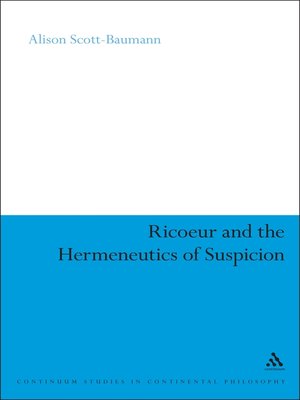Ricoeur and the Hermeneutics of Suspicion
ebook ∣ Continuum Studies in Continental Philosophy
By Alison Scott-Baumann

Sign up to save your library
With an OverDrive account, you can save your favorite libraries for at-a-glance information about availability. Find out more about OverDrive accounts.
Find this title in Libby, the library reading app by OverDrive.



Search for a digital library with this title
Title found at these libraries:
| Library Name | Distance |
|---|---|
| Loading... |
Paul Ricoeur (1913-2005) was one of the most prolific and influential French philosophers of the Twentieth Century. In his enormous corpus of work he engaged with literature, history, historiography, politics, theology and ethics, while debating 'truth' and ethical solutions to life in the face of widespread and growing suspicion about whether such a search is either possible or worthwhile.
In Ricoeur and the Hermeneutics of Suspicion, Alison Scott-Baumann takes a thematic approach that explores Ricoeur's lifelong struggle to be both iconoclastic and yet hopeful, and avoid the slippery slope to relativism. Through an examination of the 'hermeneutics of suspicion', the book reveals strong continuities throughout his work, as well as significant discontinuities, such as the marked way in which he later distanced himself from the 'hermeneutics of suspicion' and his development of new devices in its place, while seeking a hermeneutics of recovery. Scott-Baumann offers a highly original analysis of the hermeneutics of suspicion that will be useful to the fields of philosophy, literature, theology and postmodern social theory.
In Ricoeur and the Hermeneutics of Suspicion, Alison Scott-Baumann takes a thematic approach that explores Ricoeur's lifelong struggle to be both iconoclastic and yet hopeful, and avoid the slippery slope to relativism. Through an examination of the 'hermeneutics of suspicion', the book reveals strong continuities throughout his work, as well as significant discontinuities, such as the marked way in which he later distanced himself from the 'hermeneutics of suspicion' and his development of new devices in its place, while seeking a hermeneutics of recovery. Scott-Baumann offers a highly original analysis of the hermeneutics of suspicion that will be useful to the fields of philosophy, literature, theology and postmodern social theory.







